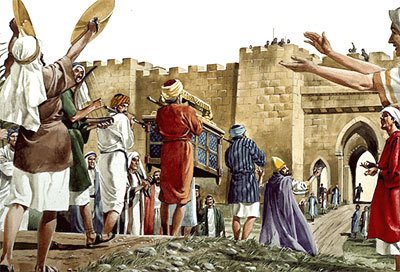October / November 2015 - Vol. 82
“I
Will
Build You a House”
. King
David's accomplishments The passage opens with David having achieved a certain level of accomplishment. We might say that David has “arrived”: After the king (David) was settled in his palace and the Lord had given him rest from all his enemies around him... (2 Samuel 7:1).David is settled, David is at rest. We see him here at the culmination of a 10- to 15-year struggle to work through a challenging leadership succession from Saul to himself. He has had to battle to consolidate his kingdom, to subdue enemies both external and internal. He has demonstrated mastery of military affairs, political and executive leadership, charismatic visioning and getting people to follow him. The guy is even good at writing songs! David has arrived.  David brought the Ark of the Covenant to Jerusalem A
classic turning of the tables David said to Nathan the prophet, “Here I am, living in a palace of cedar, while the Ark of God remains in a tent.” Nathan replied to the king, “Whatever you have in mind, go ahead and do it, for the Lord is with you.”But God had other plans: That night, the word of the Lord came to Nathan, saying: “Go and tell my servant David, ‘This is what the Lord says: Are you the one to build me a house to dwell in? I have not dwelt in a house from the day I brought the Israelites out of Egypt to this day. I have been moving from place to place with a tent as my dwelling. Wherever I have moved with all the Israelites, did I ever say to any of their rulers whom I commanded to shepherd my people Israel, “Why have you not built me a house of cedar?”This is a classic turning of the tables. God sets David straight on the order of the relationship. He says to David in effect: You want to build a house for me? Thanks but that’s not the way it works. I am building a house for you. God
enlightens David's desire He made him this way – men love to build things, we are wired to build things. Several years ago we put a major addition on our home. I enjoyed every minute of it – working with the architect to lay out the plans, coming home every day to check the construction, smelling the new wood. Men are wired to build things, it’s in our nature. So God is not rebuking David for his desire to build. But he is saying to David: thanks, I appreciate your heart, your desire to build something for me. But let me show you the way this really works, what’s really going on here: I am building you a house. He does not step on David’s desire, he enlightens it: thank you for your offer, but let me reveal to you the deeper truths. Where
David needs God's revelation Natural man comes to God with a transactional mentality – I will do this for you, and I want you to do X for me. You could fill in the X any number of ways: bless me with prosperity, give me peace, don’t destroy me, etc. But God does not need us to do things for him. Psalm 50: “I have no need of a bull from your stall…I own the cattle on a thousand hills.” From Acts 17, Paul in Athens says, “The God who made the world and everything in it…. does not live in temples built by hands. And he is not served by human hands, as if he needed anything.” I see David approaching God with this kind of transactional thinking. David hasn’t quite “got it” yet. There is a transaction taking place but it is a transaction from the Father to his son. God is building him a house, not the other way around. David needs revelation to understand the true nature of the relationship. The second way that David needs revelation is in seeing the full scope of God’s action – what God is doing is much bigger in scope and nature than David can see or conceive. David wants to build in cedar, God wants to build with souls. David is thinking of dead stones, God is thinking of a living temple of endless praise. Where
we need God's revelation This reminds me of Hughes’ rule for home maintenance. Whenever I am doing a chore at home, I sit down to calculate how long this chore should take. Then I double the estimate and change the units. For example, if I calculate that a chore should normally take two minutes, my experience tells me it will really be four hours. Similarly a three hour chore becomes six days. Unfortunately I’ve found this to be a pretty accurate system of estimating. This is how it is with God’s scope – imagine what God is doing then double it and change the units. His scope is bigger, his plans are bigger, his view is bigger: David, don’t think about cedar houses, think about living temples. David's
response to God's revelation Then King David went in and sat down before the Lord, and he said: “Who am I, O sovereign Lord, and what is my family that you have brought me thus far? And as if this were not enough in your sight O sovereign Lord, you have also spoken about the future of the house of your servant. Is this your usual way of dealing with man, O sovereign Lord?On the surface this may not seem that astounding, but in the culture of that day you didn’t sit down in the presence of a superior. Every good Jew would know that one stands to worship in the presence of the Lord. There were no pews in the holy of holies, no places to sit down. So why does David sit down in the presence of the Lord? Is this the beginning of a new informality in worship, a new breakthrough in worship freedom? Is David taking advantage of his new understanding of sonship? I can just come on in and make myself at home? No, I think he sat down because he could no longer stand. He was floored. His knees buckled with the enormity of revelation – I had it all wrong, God is building me a house and it is a house of much greater import than I could have ever imagined. Then he asks this question at the end, and you have to love it: is this the way you normally deal with a man? I come in with a proposal to build you a house, you turn the tables on me, you blow my mind in size and scope. Is this your normal way of working with a man? God
is relational, not transactional
First I think we need to see that we often have the same tendency as David – we often decide we want to build something for God. Like David, we too have achieved, can have arrived at a place of human confidence and decide it is time to do something for God. Our approach to God and our desire to serve him are always mixed with the human tendency to perform a transaction. We are never so pure, so spiritual, that we escape the human tendency to want to perform a transaction with God. I’ll do this for God, he will do X for me, whatever X may be for us. This may be unconscious, we may not admit to it, but it’s often there. We need to see that God is relational, not transactional, and that the primary thrust of the relationship is his desire to provide for us as his children. Second, like David, God does not rebuke us but wants to reveal the deeper things. You want to build me something, thanks but you’ve got it wrong – I am building you a house. I am your father and I will provide. I think God wants to say to each of us – I am building you a house. It’s a very personal word: I see you and know you and am building a house for you to dwell in. For our families, our children – I am building a place for them to dwell. For our communities and those we care for – I am building a place for them to dwell. Thirdly, I think we also miss the scope of what he is about: We think small, he thinks big.We also need to see that it’s OK that we don’t “get it,” that we miss the scope and miss the relationship. God is used to it. Do we think David “got it” even after this revelation? I don’t think he really understood the total scope. He saw a glimmer, and that glimmer was enough to floor him. Our
response to God's work in our midst
So what is our response? Like David we need to be stunned as we consider his work and the privilege of serving him. Our knees need to buckle so that we are forced to sit down before him and say: Who am I that I should be so favored? God is building us a house, brothers and sisters. Let’s
go into that house and worship him.
|
. | |||
|
publishing address: Park Royal Business Centre, 9-17 Park Royal Road, Suite 108, London NW10 7LQ, United Kingdom email: living.bulwark@yahoo.com |
. |
 .
. 